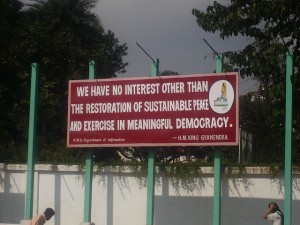 There’s something about arriving in this city that has got me on edge. Not nervous or frightened, just curious and a little perplexed.
There’s something about arriving in this city that has got me on edge. Not nervous or frightened, just curious and a little perplexed.
It’s the contradictions. The way my expectations have been fulfilled and challenged almost immediately upon my arrival.
As we flew in, the plane dropped into a vast green valley, a lush and vibrant haven dotted with colourful houses, settled like little islands among the fertile pastures.
The sharpness of some green can take you aback, the freshness of it seeming fake somehow. I looked down at that valley and thought ” nothing can really be this green”.
Shangri-La is in Tibet, but you could be forgiven for imagining that it is really here, in this place, this mysterious city they call Kathmandu.
The Nepali man sitting beside me smiled.
“It used to be a lake you know? They drained it and that’s how Kathmandu was formed. The whole city sits on a mud flat. When the earthquake comes – the big one they all know will come eventually – then all of this will simply slide away.”
I stared down once more at the valley below me. At that precarious man-made haven that sat quietly awaiting its fate, at that green that would one day be swept away, and realised that the sense of an illusion thatI had first imagined when I saw that green, was perhaps not such an unnatural reaction after all.
Kathmandu.
Here is what I had imagined prior to my arrival.
A city of temples an bustling streets. A city where the living goddess, the Kumari, bestows brief and elusive smiles from her window, the tourists that pay homage to her perhaps unaware that this child, this small girl, has the power to determine the right of the King to rule over his kingdom.
I recalled images of the funeral pyres at Pashupatinath – of the royal massacre in 2001,
the strange story of Prince Dipendra still haunting my imagination.
Here was a sophisticated and well educated Prince who massacred his entire family for love, or so they say.
Rumours abound as to who the real evil-doers are, and the new King Gyanendra seems to be viewed with suspicion by those who cannot believe that their Crown Prince was ever capable of such a heinous crime.
Kathamdnu – a city of secrets and mystery, of intrigue and superstition. A city as close to an imagined place as it is possible to find on the planet.
This was my imagined vision of Kathmandu.
And it is true. This is a Kathmandu you can find.
But it is a place of enormous contradictions.
The Kumari still smiles from her window in her city of temples while ten minutes walk away, the customers of the Java Coffee House order their cappuccinos and muffins, their casual dress of jeans and t-shirt indistinguishable from the uniform found across the globe. They sit inside, sipping their drinks while down on the street below the lepers beg and the cattle roam free.
Kathmandu. A place between two worlds, two eras. In between past and present. In a time all of its own.
But confronted by the present more and more.
All around the city, the government announces its commitment to democracy and the rule of law. A defiant and strong stance against the Maoist rebels who encircle it and who still have a hold over vast swathes of the country.
You hear tales of these insurgents lying in wait in the hills demanding money from the passing trekkers. These mythical rebels who seem to belong to another era, to an age when communism seemed like an alternative, when Che Guevara was a hero. These insurgents who come to greet you in the hills, dressed in brightly coloured knitted hats, smiling and curious, who produce a receipt thanking you for your ” voluntary donation”, their smiles and cheerful attire belying some terrible truths about child soldiers forced into their war of liberation, a war that has cost 12,000 lives in the past decade.
A war justified by the inequalities of Nepali life, by corruption and cronyism at the heart of government. A war driven by acute poverty and frustration.
A war, like any other war, that leaves you unsure as to who is right or who is wrong. You pass the soldiers on the street in Kathmandu and understand the need for their presence. Then days later, high up in the hills, you smile back at the rebels and hand over your donation without complaint.
The contradictions and confusion are never far away in this place.